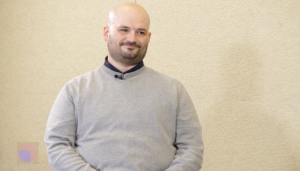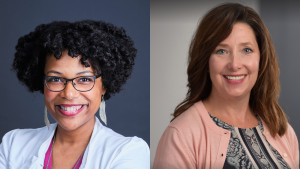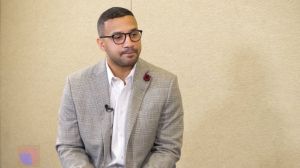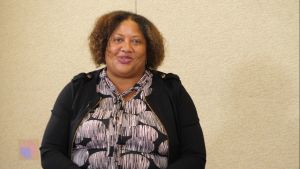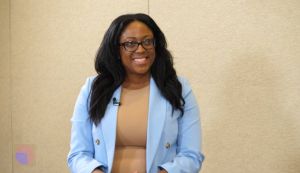Following the murder of George Floyd, many companies got more intentional and focused on their diversity, equity and inclusion efforts than ever before. For some, that meant hiring their first Chief Diversity Officer while others had to experience a shakeup in leadership around diversity entirely.
For Chief Diversity Officers, the last few years has been tumultuous. Some have sought new roles as former employers failed to deliver on promises and others chased new challenges where they felt they could make a greater impact, find better resources or simply grow their own careers.
This interview is the latest in a series of articles dedicated to catching up with CDOs who have moved in recent years to discuss their experience, what the move has done for them, the work they’re doing and the advice they have for other aspiring or current CDOs.
Helena Haynes-Carter, Executive Vice President and Chief Diversity Equity and Inclusion Officer at KeyBank shares how over the course of her career, she has had the ability to see how DEI works across industries and companies of different sizes. During the COVID-19 pandemic, she served as Senior Director, Global Diversity Equity & Inclusion for UnitedHealth Group where she orchestrated a $14 million response with community-based organizations throughout the U.S., deploying over 30,000 COVID-19 tests, wrap-around services and care referrals.
Interview with Helena Haynes-Carter
Fair360, formerly DiversityInc: You’ve had experience working in diversity across a variety of industries. What sort of lessons have you learned through that experience that you bring into your work at KeyBank? How does that inform your perspective on DEI work?
Helena Haynes-Carter: My experiences span six industries, (Financial Services, Healthcare, Consulting, Housing, Transit, and Energy) as well as all three sectors of business (Corporate, Nonprofit, and Government). No matter what industry or sector, I believe the best practices for diversity, equity and inclusion (DEI) have consistent and foundational pillars. And then, each company needs to adopt a DEI strategy to align with their own culture and success objectives. Every industry has unique levers that can be leveraged to create unique value for its shareholders.
At this point in history, companies have a renewed emphasis on DEI, and we cannot let this moment slip away without maximizing the opportunity. We must reflect the substantive and sustained gains in the diversity of our workforces and communities. The increases in diverse leaders in power positions are of particular importance to accelerate transformation in policies, workforce composition and marketplace innovation. We’re charged with delivering the solutions to drive equitable and inclusive futures. That happens when chief DEI officers lead boldly, deliberately collaborate, serve with humility, listen actively and use their seat at the table to elevate others economically and spiritually.
What impact has the move to KeyBank had on your career and how would you describe your time with the company thus far?
I started at KeyBank in January 2022, and time will tell what the impact will be on my career. I am certain that this was the right move at the right time. I stand on the shoulders of powerful KeyBank leaders past and present. Greats such as Margot Copeland, the organization’s first Diversity executive; Beth Mooney, the industry’s first female CEO; Trina Evans, current Chief of Staff and Corporate Center Director; our current CEO Chris Gorman, and others.
As an executive in the financial services industry with heavy economic and community development expertise, I recognize the detriment to diverse communities now that our nation is experiencing inflation at 40-year highs after we have experienced a two-year-plus pandemic and Civil Rights losses abound. The promise of the American dream is far from being realized.
At Key, we view DE&I as a business accelerator, and we can realize the opportunities for systemic wealth-building in the communities we serve, for families, our children and our children’s children. KeyBank is the United States’ second largest affordable housing lender and as a relationship bank, Key has a niche positioning in the Middle Market business sector (for businesses with annual revenues between $10M and $1B).
We differentiate ourselves further with unique vertical businesses in Healthcare, Digital Payments, and other sectors.
According to a 2018 report from the Minority Business Development Agency, minority-owned firms with employees average nine workers and $1.41 million in annual receipts. By creating access, innovative products/services and expanding relationships to accelerate the gains for these business owners, their employees, families, and other diverse clients, the impacts can be transformative. The legacy of my career is tied to economic empowerment and a road map to expand success.
What are some of the initiatives you’ve been excited to work on since joining KeyBank and what are some of the lessons that you’ve learned through that work?
I am excited that at KeyBank we have set a high bar of achievement. Yes, we glean from the best practices and learn from others, yet the sky is the limit. While our strategies are proprietary, the journey occurs one step at a time.
- Step one – Chris Gorman, Key’s Chairman and CEO wants KeyBank to be the best place for diverse professionals to work.
- Step two – With humility, we do not take our long, rich legacy of Diversity, Equity, & Inclusion commitment for granted. In collaboration with our partners — like Fair360, formerly DiversityInc., INROADS, the National Community Reinvestment Council, students, universities, governments, professional associations, and clients — we’re continuously improving, assessing, building, and strengthening our foundation to reach new heights.
- Step three – Our twelve (12) employee resource groups – known as KeyBank Impact Network Groups (KBINGs) — are focused on priorities that support themselves and the communities that matter to them from Maine to Alaska.
- Finally, we’re committed to sustaining the focused execution it takes to advance our DEI efforts, a journey to watch and to hopefully emulate.
How do you see DEI work evolving in the years to come and what excites you about the future?
I’m excited for KeyBank – and all organizations – to strengthen and sustain our momentum across DEI. There are compelling business, moral and social cases for DEI in corporate America, and we have the responsibility to get it right.
Equity and inclusion are actions that must be embedded into business practices… or what I and others often refer to as “operationalizing.” We must set a high bar and raise it, focus on results and impacts, and continuously improve. DEI goes beyond commitments and must be core to “business as usual.”
Part of evolving DEI is to provide safe spaces for others. KeyBank has a proud DEI legacy of over two decades, and we always continue to strengthen how we show up. No matter how long we’ve been at this, we must always do more to win hearts and minds across our workforce, workplace and marketplace.
What advice do you have for aspiring or current Chief Diversity Officers who are thinking about moving from where they are? What do they need to think about as they consider companies, negotiations, teams, etc?
A few weeks ago, I coached a former colleague who’s moving into a Diversity, Equity and Inclusion leadership position. My advice was simple: be their brilliant self! Years of study, successes, bruises, agility, lessons, waiting and preparation have led them to this threshold. And regardless of the title, they will continue to dismantle broken systems, institutionalize solutions and expand access and opportunity.
The days will be long and sometimes lonely. This is not glamorous work, but they must trust that they have the tools and the fortitude to be successful. My shoulder will be available to stand on just as KeyBank and others have extended grace and hoisted me to new heights.









